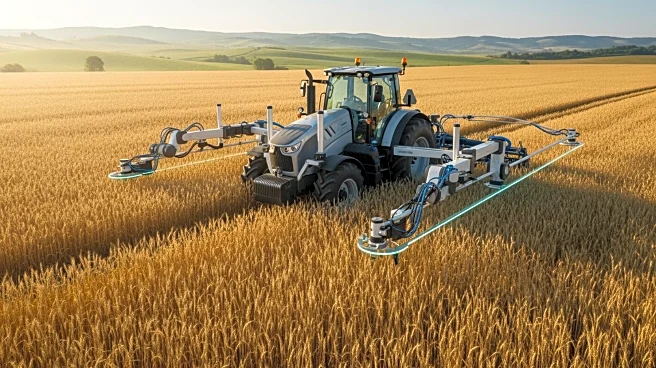What's Happening?
Farmers in south-central Wisconsin, including Emily and Avery Elsing, are preparing for the next wave of autonomous technology in agriculture. The Elsings, who manage a family-owned operation growing corn, soybeans, alfalfa, and wheat, as well as raising
cattle, are considering technological upgrades to improve efficiency. Bryce Baker, North American tactical marketing lead for Precision Planting, suggests that farmers invest in aftermarket kits to automate processes like grain cart duties and tillage. The Elsings have already integrated Precision Planting technology and Climate FieldView for crop data into their operations. They are exploring further investments in precision spraying technology and autonomous grain cart functions to address labor shortages and enhance productivity.
Why It's Important?
The integration of autonomous technology in farming is crucial as it addresses labor shortages, a significant challenge for agricultural operations. By adopting these technologies, farmers can increase efficiency and reduce dependency on manual labor, which is becoming increasingly scarce. This shift not only promises to streamline operations but also positions farmers to remain competitive in a rapidly evolving industry. The Elsings' approach highlights the importance of being open to technological advancements to sustain long-term agricultural productivity and profitability. As more farmers adopt these technologies, it could lead to broader changes in farming practices and economic impacts on rural communities.
What's Next?
Farmers like the Elsings are expected to continue monitoring technological developments and assess how new products can be integrated into their operations. The focus will likely be on technologies that offer the best return on investment and address specific challenges such as labor shortages. As autonomous technology becomes more prevalent, farmers may need to adapt their strategies and operations to fully leverage these advancements. This could involve training for new systems and potentially restructuring farm management practices to accommodate automated processes.
Beyond the Headlines
The adoption of autonomous technology in agriculture raises ethical and cultural considerations, particularly regarding the impact on rural employment and community dynamics. While technology can enhance efficiency, it may also lead to reduced job opportunities in traditional farming roles, necessitating a shift in workforce skills and training. Additionally, the reliance on technology could alter the cultural landscape of farming, traditionally seen as labor-intensive and community-oriented. These changes may require careful management to balance technological benefits with social and economic impacts on farming communities.















